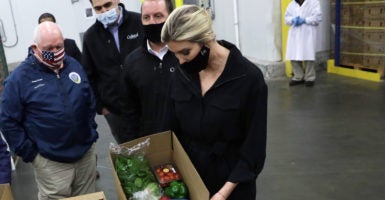After delivering 1.6 million boxes of food to food banks across the country, the Department of Agriculture is in the final stages of deciding which cities and states have been hurt the most economically by the COVID-19 pandemic to ascertain where to send additional food for needy families.
The U.S. Department of Agriculture’s Farmers to Families Food Box program buys food from farmers and food suppliers whose workforces were hit hard by the coronavirus-driven closure of restaurants. The food is provided to underserved areas, specifically targeted with distributors who will assist in filling the “hunger gap,” according to the White House.
To date, the program has delivered 1.6 million boxes of the nearly 20 million boxes contracted distributors have sent to their partner food banks, the White House said. The $3 billion program authorized by coronavirus relief legislation was set to continue through the end of June and could be extended, according to the USDA.
>>> What’s the best way for America to reopen and return to business? The National Coronavirus Recoverya Commission, a project of The Heritage Foundation, assembled America’s top thinkers to figure that out. So far, it has made more than 260 recommendations. Learn more here.
Recently, representatives of the USDA; White House officials, including President Donald Trump’s daughter Ivanka; and the Rev. Paula White, adviser to the White House Faith and Opportunity Initiative, attended a Farmers to Families event in Pittsburgh.
“The ingenuity, compassion, and determination of senior adviser Ivanka Trump was on full display in Pittsburgh, Pa., at the Temple Pentecostal Church of God in Christ through the Farmers to Families program,” White told The Daily Signal in a statement, adding:
Through her leadership, she has assembled a massive, unprecedented, faith-based network across America, which is reaching [the] needs of millions in underserved and distressed communities.
These lives are being impacted with the nutritious food boxes that have become a [lifeline] during these challenging times for those who are experiencing food insecurity.
The Trump administration’s Opportunity Zones initiative will have an increased focus on the program in order to direct food to underserved areas, the White House said.
Agriculture Secretary Sonny Perdue was among the administration officials at the June 16 event in Pittsburgh, along with the president’s daughter, White, and White House Opportunity and Revitalization Council Executive Director Scott Turner.
They helped distribute the Farmers to Families food boxes, along with nonprofit partners CityServe and World Vision in the visit to the Pentecostal Temple Church, an African American house of worship.
Perdue announced the program in April after passage of the Families First Coronavirus Response Act to buy agricultural products and distribute them to those in need.
Congress authorized the USDA to buy up to $3 billion in fresh produce, dairy, and meat products, according to the department. To start with in May, the USDA purchased $461 million worth of fresh fruits and vegetables, $317 million in dairy products, $258 million in meat products, and $175 million in a combination box of fresh produce, dairy, or meat products.
The USDA has worked with companies packaging products into family-sized boxes, then has had them transported to food banks, community and faith-based organizations, and other charities since May 15. The department may choose to extend the contracts, via option periods, depending upon program success and available remaining funds, up to $3 billion, the USDA said.
































